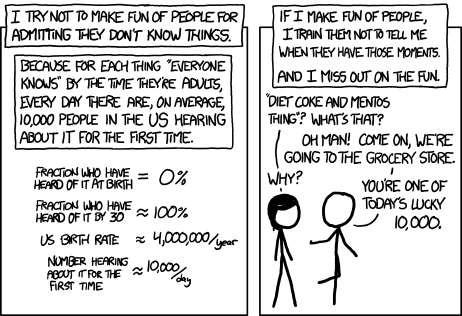It seems like every year, I meet someone at WisCon who has gone to other SF/F cons before but is a WisCon newbie. You can spot such a person because at the moment when we all pull out our handy-dandy pocket programs and/or schedule apps and start talking about what panels we want to go to, the seasoned newcomer says in a perfect Elle-Woods-on-first-day-of-law-school voice, “Who goes to panels at a con?”
I don’t point this out to shame the people who have done this, or the people who will do so this year. If you’re fortunate enough to witness this moment, feel blessed, because you are about to watch something beautiful happen, something as miraculous and wondrous and yet predictable as a beautiful butterfly emerging from a chrysalis. You’re seeing the WisCon equivalent of one of xkcd’s “lucky 10,000” moments:
In other words… yeah, they don’t know, but they’re about to learn, and it’s going to change their lives when they do.
Not only do people go to panels at WisCon, people go to WisCon for the panels. I haven’t been to a WisCon yet where I didn’t find myself wishing for a time-turner so I could go to more panels, including ones scheduled against each other.
I am participating in five panels this year.
My first one… in what I think is the first regular programming slot of the con… is called “We All Start Somewhere: Welcoming Social Justice Newbies”, at 4 PM on Friday.
Panel description:
Many people aren’t born into families that talk a lot about or value social justice. We come from all different backgrounds with all different kinds of experiences. When someone wants to gain a better understanding of and start practicing social justice, how do we, as a community, welcome them and offer opportunities for education? How do we deal with the same basic questions over and over again? What do we do well? What could we do better?
If this is your first WisCon, or you still feel like an outsider, I’d suggest coming to this one, as I have a feeling it’ll be a good icebreaker for the kind of discussions we have at WisCon. I for one intend to do my best to make everyone who shows up at this one feel welcome.
The second one is called “Women and Trans/Non-Binary People: The Pitfalls of Haphazard Inclusion”. It’s at 9 PM on Friday.
Panel Description:
Attempts to create calls for submissions/lists of authors with marginalized genders have come under criticism for asking for “women and non-binary” or “women and transgender people”. Adding trans and non-binary identities to “woman” often adds additional confusion for trans masculine people (are trans men included as “sort of women”, or excluded as “not a marginalized gender identity”?). Does inclusion of non-binary identities with women imply that those identities are necessarily “feminine”? Does the addition of “trans” as a separate category imply that trans women are not members of the group that is ALL women? How can we more effectively promote the inclusion of transgender, genderqueer, or non-binary authors?
Honestly, I feel like the description is soft-pedaling some aspects of the problem. I mean, I’ve seen calls for submissions and event invitations that say “women and trans women”.
My third panel is “Trans and Genderqueer People Talk RPGs”, which is the first one I’m really excited about rather than just feeling like I have things to contribute. It’s Saturday at 10:00 AM.
RPGs, whether tabletop or electronic, allow us to play characters different from our current real-life configurations. Playing RPGs can therefore be freeing for trans and genderqueer people. It can also be awkward or even triggering. What insights into ourselves or the world have we gained by playing RPGs (tabletop or electronic)? How have RPGs helped us gain catharsis? What messed up situations have we encountered?
My fourth panel is called “Trans Narratives: Pitiful and/or Powerful?”. It’s at 1:00 PM on Saturday, and goes something like this:
Some trans people experience a lot of marginalization for being trans, and some of us have quite wonderful lives. Do we have to portray ourselves as underdogs to get anywhere? Is the “pitiful trans person” narrative more destructive than it is constructive? Can we also make room to celebrate how far we’ve come in our own lives, personally and as a community?
Looking forward to this one, should be interesting.
My last panel is called “Trans Body Positivity”, and it’s one I’m moderating this year. I moderated a panel last year. I was not expecting to moderate a panel, and didn’t realize I was until the day of. Despite being the least moderate person I know, it went well, probably because I remembered the cardinal rule: always drink in moderation.
Body acceptance and positivity movements contain some very worthy goals. Living in a trans body can cause attaining those goals to be more complex and confusing, however. How a trans person feels about their body before, during, and after various stages of transition varies greatly. A trans person choosing not to transition at all (or who is unable to transition) may have to learn very different ways of accepting and loving their body. For nonbinary trans folk, there might be whole other issues to deal with. How do trans people engage with and contribute to body positive movements? What do we have to teach others from our own experiences?
This panel is at 10 AM on Sunday.

